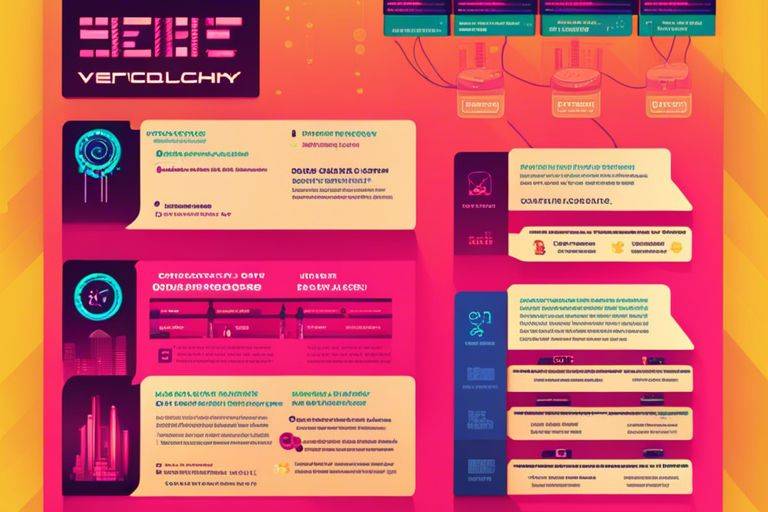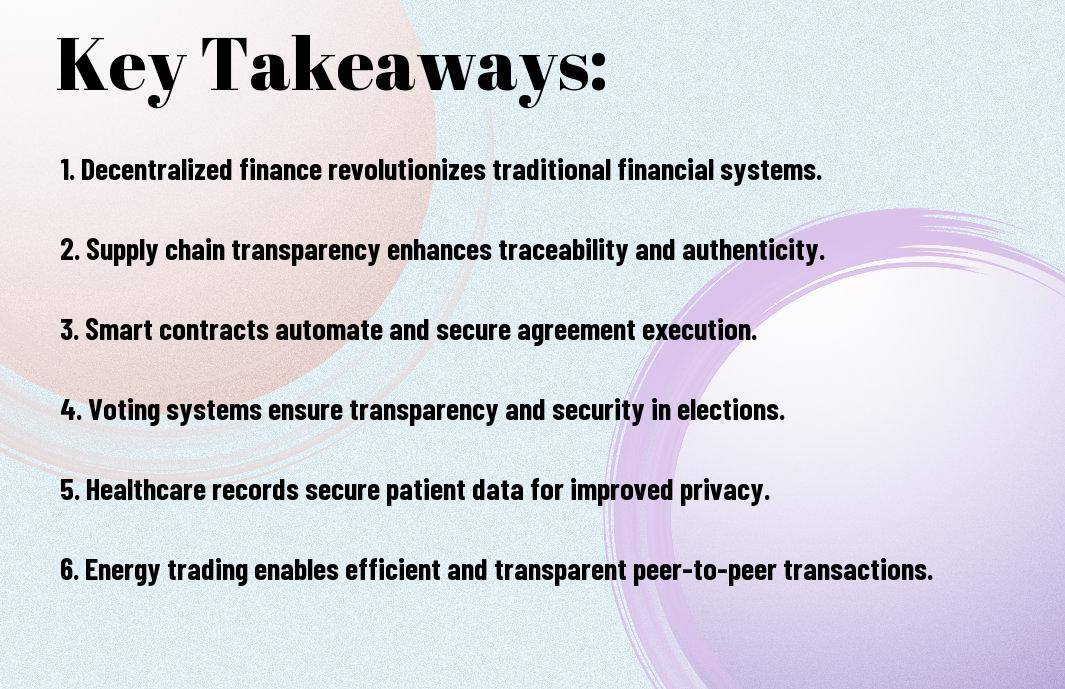
Newsletter Subscribe
Enter your email address below and subscribe to our newsletter

Enter your email address below and subscribe to our newsletter

You may think of blockchain as just the technology behind cryptocurrencies like Bitcoin, but blockchain is so much more than just crypto. Its potential applications extend far beyond digital currencies and have the power to transform industries and change the world as we know it. From supply chain management to healthcare, blockchain technology is revolutionizing various sectors by providing secure, transparent, and decentralized solutions to age-old problems.

Blockchain is a decentralized, distributed ledger technology that records transactions across multiple computers in a secure and tamper-proof way. Each block in the chain contains a cryptographic hash of the previous block, along with transaction data, creating a secure link between them. This technology enables trustless and transparent peer-to-peer transactions without the need for intermediaries.
Blockchain technology is characterized by several key features that set it apart from traditional centralized systems:
Assume that these features collectively contribute to the reliability and efficiency of blockchain technology, making it a revolutionary solution for various industries.
Once again, the impact of blockchain technology is being felt in the financial services sector. While most people associate blockchain with cryptocurrencies like Bitcoin, its potential goes far beyond just digital coins. Financial institutions are increasingly turning to blockchain for its efficiency, security, and transparency benefits. From streamlining payment processes to reducing fraud, blockchain is revolutionizing how financial services are conducted.
An interesting application of blockchain technology in financial services is the emergence of alternative cryptocurrencies. While Bitcoin remains the most well-known cryptocurrency, there are now thousands of others in circulation. These alternative cryptocurrencies often serve specific purposes beyond just being a digital currency. Some are designed for smart contracts, while others focus on privacy or scalability. The diversification of cryptocurrencies opens up new possibilities for innovation in the financial sector.
An crucial aspect of blockchain technology in financial services is the development of smart contracts and decentralized finance (DeFi) applications. Smart contracts are self-executing contracts with the terms of the agreement directly written into code. They enable trustless transactions and automate complex processes, reducing the need for intermediaries. DeFi, on the other hand, refers to a financial system built on blockchain technology that aims to recreate traditional financial services (such as lending, borrowing, and trading) in a decentralized manner. The potential of smart contracts and DeFi to disrupt the traditional financial services industry is significant.
The implementation of smart contracts and DeFi protocols is reshaping the way financial transactions are conducted. By eliminating intermediaries and automating processes, blockchain technology streamlines transactions, reduces costs, and enhances security. However, the nascent nature of these technologies also poses risks, such as vulnerabilities in code and regulatory uncertainties. As the adoption of smart contracts and DeFi continues to grow, it is crucial for stakeholders to understand both the opportunities and challenges they present.
Provenance and traceability are fundamental aspects of supply chain management that blockchain technology has revolutionized. Unlike traditional systems, where tracking goods from origin to destination can be convoluted and susceptible to errors, blockchain provides an immutable ledger that transparently records every step of a product’s journey. This enhanced visibility ensures that consumers can trust the authenticity of the products they purchase and allows businesses to verify the legitimacy of their supply chain partners.
Any industry that deals with physical goods faces the threat of counterfeit products entering the market, causing financial losses and reputational damage. Blockchain’s decentralized nature and cryptographic security measures make it exceedingly difficult for counterfeiters to infiltrate the supply chain. By ensuring that each product is assigned a unique digital identity that cannot be tampered with, blockchain technology enables businesses to track and verify the authenticity of their goods in real-time, significantly reducing the risk of counterfeits.
Traceability is a critical component of supply chain management, allowing businesses to identify and address issues such as contamination, theft, or other incidents that may compromise the integrity of their products. Blockchain’s ability to create an unalterable record of every transaction and movement within the supply chain enables swift identification of the root cause of any problem, helping businesses to take immediate corrective action and prevent widespread damage to their reputation and consumer trust.
After the contentious and often debated elections across the globe, blockchain technology offers a promising solution for ensuring the integrity of voting systems. By leveraging the immutability and transparency of blockchain, voting processes can become more secure, efficient, and accessible to a wider population. Implementing blockchain in voting systems can provide instant verification of results, prevent tampering with ballots, and enable greater voter participation through online and mobile voting.
Prospect:
Blockchain technology has the potential to revolutionize the way we conduct elections by enhancing transparency and reducing electoral fraud. With traditional paper-based voting systems vulnerable to manipulation and fraud, the decentralized nature of blockchain can offer a secure and tamper-proof way to store voting data. By recording each vote as a transaction on the blockchain, the technology ensures that votes are immutable and transparent, preventing any unauthorized changes to the results. This level of security can significantly reduce the risk of electoral fraud and increase trust in the democratic process.
Blockchain technology can also enable real-time monitoring of the voting process, allowing voters to verify that their votes were cast correctly and counted accurately. This level of transparency can help to build confidence in the electoral system, particularly in regions plagued by allegations of fraud. By integrating blockchain into voting systems, governments and organizations can create a more reliable and trustworthy electoral process that benefits both voters and authorities.

Despite its origins in the world of cryptocurrencies, blockchain technology has the potential to revolutionize the healthcare industry in ways we could only dream of a few years ago. By leveraging the power of decentralized and secure ledgers, blockchain is poised to transform how patient data is managed and how drugs are tracked through the supply chain.
For a long time, patient data has been vulnerable to breaches and unauthorized access due to centralized storage systems. With blockchain technology, sensitive information can be securely stored and accessed only by authorized parties. By utilizing encryption and decentralized storage, blockchain ensures that patient data remains immutable and tamper-proof, thus maintaining the privacy and security of individuals’ health records.
Any pharmaceutical supply chain is susceptible to counterfeit drugs entering the market, potentially putting patients at risk. Blockchain can address this issue by providing a transparent and immutable record of each drug’s journey from manufacturer to consumer. This not only ensures the integrity of the drug supply chain but also facilitates research by allowing for more accurate and timely tracking of drug effectiveness and potential side effects.
Healthcare entities that adopt blockchain technology stand to benefit from increased efficiency, transparency, and trust among patients and stakeholders. The potential to revolutionize how health data is managed and how drugs are tracked makes blockchain a powerful tool in the ongoing quest to improve healthcare outcomes worldwide.
Not just a platform for financial transactions, blockchain technology has the potential to revolutionize the way intellectual property (IP) rights are managed in various creative industries. By leveraging the transparency, security, and immutability of blockchain, creators can protect their creations and ensure they receive fair compensation for their work.
The decentralized nature of blockchain allows for the secure storage and verification of intellectual property rights across borders. This means that creators can have their work timestamped and stored on the blockchain, providing irrefutable proof of ownership.
Creators can use blockchain to create unique, tamper-proof digital certificates of authenticity for their work, helping to combat issues such as copyright infringement and plagiarism. By utilizing smart contracts on blockchain platforms, artists can also automate royalty payments, ensuring they receive compensation whenever their work is used or sold.
Industries in the creative sector, including music, film, art, and literature, stand to benefit immensely from the implementation of blockchain technology. The ability to track and manage intellectual property rights in a transparent and secure manner can help in reducing piracy, ensuring fair compensation for creators, and fostering a more collaborative and innovative environment within these industries.
Unlike traditional cryptocurrency applications, blockchain technology is revolutionizing the energy sector through various innovative solutions. From optimizing energy distribution to enabling renewable energy tracking, blockchain is reshaping the way we generate, distribute, and consume energy.
Tracking Distributed Energy Grids and Renewable Energy sources are vital in today’s era of climate change and sustainability. Blockchain technology provides a secure and transparent platform for tracking the source of renewable energy generation and ensuring that it is distributed efficiently. By recording energy production and consumption data on a decentralized ledger, stakeholders can have real-time visibility into energy transactions, leading to a more reliable and sustainable energy grid.
Grids Tokenization of Energy Assets involves representing energy assets as digital tokens on a blockchain network. This innovation allows users to buy, sell, or trade fractions of energy assets, such as solar panels or wind turbines, making renewable energy investments more accessible to a broader range of investors. Moreover, the tokenization of energy assets can unlock new financing options for renewable energy projects, accelerating the transition towards a cleaner and more decentralized energy ecosystem.
Sector The tokenization of energy assets presents a transformative opportunity for the energy sector by democratizing investment opportunities and creating new avenues for funding renewable energy projects. This process not only enhances the liquidity of energy assets but also promotes greater participation in the renewable energy market, ultimately driving the shift towards a more sustainable energy landscape.

Charity organizations are under increasing pressure to be more transparent about how they use their funds and to be accountable for their actions. Blockchain technology offers a solution to this challenge by providing a secure and immutable ledger that can track every donation made to a charity organization. This transparency ensures that donors can see exactly how their funds are being used, eliminating any doubts about misuse or mismanagement.
Communities that have been historically marginalized often lack access to traditional financial systems and are at a disadvantage when it comes to economic opportunities. Blockchain technology can empower these communities by providing them with a secure and decentralized platform for financial transactions and access to global markets. It can also enable them to establish verifiable identities, which is crucial for accessing services such as healthcare and education.
Many industries are experiencing a transformation thanks to blockchain technology. According to How Blockchain Technology Is Changing The World, the future of work is being shaped by blockchain in ways that were previously unimaginable. From streamlining processes to creating new opportunities, the impact of blockchain on the job market is profound.
The concept of Decentralized Autonomous Organizations (DAOs) is revolutionizing the job market by offering a new way of organizing work. DAOs are entities that operate through rules encoded as computer programs on a blockchain, allowing for decentralized decision-making and eliminating the need for traditional hierarchical structures. This model empowers individuals to collaborate and contribute to projects in a more autonomous and transparent manner. With smart contracts governing interactions and payments, DAOs are reshaping the future of work by creating opportunities for borderless, trustless collaboration.
Blockchain technology has also enabled the rise of crowdsourcing and freelancing platforms that connect individuals directly without the need for intermediaries. These platforms leverage smart contracts to ensure secure and transparent transactions between clients and freelancers. Understanding the potential of blockchain in crowdsourcing and freelancing platforms is crucial for embracing the future of work. By eliminating intermediaries and enabling direct peer-to-peer interactions, these platforms offer increased efficiency, lower costs, and expanded opportunities for individuals worldwide. Companies and workers alike can benefit from this decentralized approach, which not only streamlines processes but also ensures fair compensation and data security.
To navigate the intricate landscape of blockchain regulation, it is vital to understand the diverse legal frameworks that apply to this technology. Regulation around blockchain varies significantly from country to country, leading to a complex environment for businesses and individuals alike. Factors such as data protection, financial regulations, anti-money laundering laws, and taxation must all be considered when implementing blockchain solutions.
Innovation in the blockchain space often outpaces regulatory developments, posing a challenge for companies striving to balance innovation with legal compliance. Adopting blockchain technology requires navigating a fine line between pushing boundaries to drive innovation and ensuring adherence to existing laws and regulations. Proactively engaging with regulators, seeking legal counsel, and staying updated on legal developments are crucial steps for companies to mitigate risks and operate within the bounds of the law.
Legal compliance is vital for long-term sustainability and growth in the blockchain industry. Non-compliance with regulations can lead to hefty fines, legal repercussions, and reputational damage. Companies must prioritize compliance efforts by conducting thorough legal assessments, implementing robust compliance programs, and fostering a culture of adherence to regulatory requirements.

One of the key predictions for the future of blockchain technology is its widespread integration into various industries beyond finance. Sectors such as healthcare, supply chain management, voting systems, and real estate are expected to adopt blockchain to increase transparency, security, and efficiency. Interoperability between different blockchain platforms is also on the horizon, allowing for seamless transactions across networks.
Another prediction is the continued evolution of smart contracts and decentralized applications (DApps), offering automated and trustless systems for various operations. The advancement of scalability solutions like sharding and layer 2 protocols will address the current limitations of blockchain networks, paving the way for mass adoption.
One of the crucial aspects of preparing for a blockchain-integrated society is ensuring widespread education and understanding of the technology. Blockchain literacy will be crucial for individuals to participate in decentralized networks, manage digital assets securely, and leverage the full potential of blockchain applications. Organizations and governments will need to invest in training programs and awareness campaigns to bridge the knowledge gap.
On the whole, it is evident that blockchain technology has far-reaching implications beyond just cryptocurrencies. From improving supply chain management to enhancing voting systems and securing data privacy, the potential applications of blockchain are vast and can truly change the world we live in. By leveraging the immutable and transparent nature of blockchain, industries across the board can benefit from enhanced security, efficiency, and trust.
As we continue to explore and innovate with blockchain technology, it is crucial to recognize its transformative power and explore the various ways it can be integrated into everyday processes to drive positive change. By understanding the diverse applications of blockchain beyond just crypto, we can truly harness its potential to revolutionize industries and pave the way for a more secure and decentralized future.
A: Blockchain technology is a decentralized, distributed ledger that securely records transactions across multiple devices. Each transaction is recorded in a “block” that is linked to the previous block, creating a chain of blocks – hence the term “blockchain.”
A: While cryptocurrencies like Bitcoin operate on blockchain technology, blockchain itself is a broader concept that can be applied to various industries beyond finance. Cryptocurrencies are just one of the many applications of blockchain.
A: Blockchain technology can be used for supply chain management, voting systems, healthcare records, identity verification, smart contracts, and more. Its decentralized nature and secure design make it ideal for various industries.
A: Blockchain can provide transparency and traceability in the supply chain by recording every transaction and movement of goods. This helps in detecting fraud, ensuring product authenticity, and reducing inefficiencies.
A: Smart contracts are self-executing contracts with the terms of the agreement directly written into code. They automatically execute and enforce the terms of the contract when predefined conditions are met, operating on the blockchain’s decentralized network.
A: Blockchain can securely store and manage healthcare records, ensuring data integrity and patient privacy. It can also streamline processes like insurance claims processing, drug traceability, and clinical trials management.
A: Yes, Blockchain technology is secure and immutable due to its decentralized nature and cryptographic algorithms. Once a block is added to the chain, it cannot be altered, making it highly resistant to tampering and fraud.